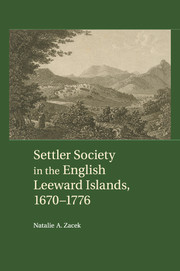Book contents
- Frontmatter
- Contents
- List of Tables
- Acknowledgments
- Map
- Settler Society in the English Leeward Islands, 1670–1776
- Introduction
- 1 The Challenges of English Settlement in the Leewards
- 2 Irish, Scots, and English
- 3 Managing Religious Diversity
- 4 Sex, Sexuality, and Social Control
- 5 Political Culture, Cooperation, and Conflict
- Conclusion
- Bibliography
- Index
- References
4 - Sex, Sexuality, and Social Control
Published online by Cambridge University Press: 05 July 2011
- Frontmatter
- Contents
- List of Tables
- Acknowledgments
- Map
- Settler Society in the English Leeward Islands, 1670–1776
- Introduction
- 1 The Challenges of English Settlement in the Leewards
- 2 Irish, Scots, and English
- 3 Managing Religious Diversity
- 4 Sex, Sexuality, and Social Control
- 5 Political Culture, Cooperation, and Conflict
- Conclusion
- Bibliography
- Index
- References
Summary
INTRODUCTION
Perhaps the most prevalent image of the English West Indian colonies in the era of sugar and slavery is of these islands as places of sexual license, in which white settlers enjoyed boundless opportunities for sensual gratification both with one another and with their slaves. In the absence of church courts and other sacred and secular institutions that aimed to regulate sexual behavior in the metropole and in the North American colonies, West Indian colonists supposedly devoted themselves to the pursuit of sexual pleasure, often across racial boundaries, and simultaneously failed to create the sorts of stable families that might have become the foundations of a recognizably English society. As Maaja Stewart has observed, eighteenth-century narratives about the West Indies, fictional and factual alike, are replete with “images that represent the breakdown of the nuclear family,” such as instances of “adultery, bigamy, incest, and illegitimacy.” In the eighteenth-century Anglo-American popular imagination, the morality of the island colonies was undermined by several interrelated factors. The first was environmental, as it was easy to associate a sultry tropical climate with sensual excess; William Pittis, the author of The Jamaica Lady (1720), had his character Pharmaceuticus, a ship's surgeon, assert that the very air of the West Indies “so changes the constitution of its inhabitants that if a woman land there chaste as a vestal, she becomes in forty-eight hours a perfect Messalina.”
- Type
- Chapter
- Information
- Settler Society in the English Leeward Islands, 1670–1776 , pp. 169 - 205Publisher: Cambridge University PressPrint publication year: 2010



